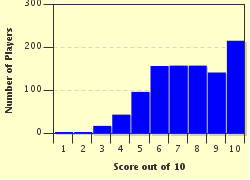Quiz Answer Key and Fun Facts
1. This question is about The Treaty of Paris. Which one you ask? Good question, there were 24 'treaties of Paris' (or ones with similar names) signed between the years 1000 and 2000. Well, this treaty is the one Napoleon signed in 1815, after his loss at which battle?
2. The 1657 Treaty of Paris created a military alliance, between what two countries, against Spain?
3. Which of these wars did NOT end with a Treaty of Paris?
4. There were two major treaties that ended the War of the Spanish Succession. One was the Treaty of Rastatt, signed in 1714, and which other one, signed a year earlier in the Dutch city of Utrecht?
5. The Treaty of Guadalupe Hidalgo was a treaty, written mostly by the United States that ended which war in 1848?
6. The Treaty of Nanjing was signed in 1842, and provided, among other things that the Chinese should give Britain Hong Kong as a Crown Colony. In 1898 a further area was added to Hong Kong but on lease. How long was the lease for?
7. This treaty, signed in 1706, created Great Britain, by merging the Kingdom of England and the Kingdom of Scotland. What was the name of the treaty?
8. The Geneva Conventions are a series of agreements signed to give the victims of war, humanitarian treatment. They protect wounded or sick fighters, prisoners of war, civilians, and medical and religious personnel.
9. The Molotov-Ribbentrop Pact was signed in 1939 by Soviet minister Vyacheslav Molotov and German minister Joachim von Ribbentrop. Which of these was also a name given to that treaty?
10. Of course, any quiz about treaties wouldn't be complete with a question on the Treaty of Versailles. On what date was this historic document signed?
Source: Author
George95
This quiz was reviewed by FunTrivia editor
bloomsby before going online.
Any errors found in FunTrivia content are routinely corrected through our feedback system.


